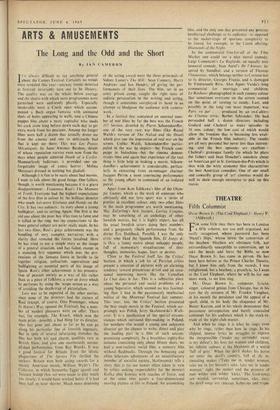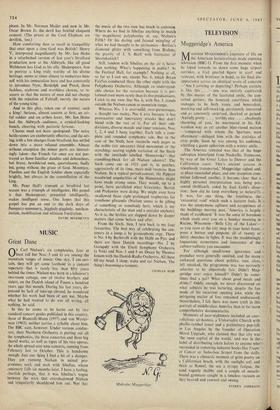THEATRE Fifth Columnist
FOR some little time there has been in London a fifth column, not too well organised, not easily recognised, whose password has been 'Hazel's Hips,' whose intent the conversion of the heathen. Heathen are obstinate folk, not extraordinarily susceptible to conversion, apt to take the beads and leave the Bible, so now Oscar Brown Jr. has come in person. He has been here before at the. Prince Charles Theatre, but I knew him only from the records. I was enlightened, but a heathen: a proselyte. So I went to the Cool Elephant, where he will be for one more week, to see him sing.
Mr. Oscar Brown Jr., composer, lyricist, singer, coloured genius from Chicago, has in his eyes the sly sexiness of Mr. Frankie Vaughan, in his mouth the petulance and the appeal of a spoilt child, in his body the eloquence of Mr. Buster Keaton, and in his whole demeanour that passionate introspection and barely concealed contempt for his audience which is the stock-in- trade of the night-club master.
And when he sings it is what he sings. even why he sings, rather than how he sings. In his clipped, intense lyrics he struggles to express the inexpressible ('tender my surrender, sweet is my defeat'), his love .for women and children, his infinite sadness at the bleakness of a world 'full of grey.' When the devil shakes his horns we enter the devil's country. full of sly in- sinuating snakes ('Take me in. tender woman, take me in for heaven's sake, take me in tender woman,' sighs the snake) and the promise of ever wilder and wilder 'kicks.' The God-songs are wistful. sorrowful, sometimes, alas, cute; the devil songs are raucous. lecherous and trium- phant. In Mr. Norman Mailer and now in Mr. Oscar Brown Jr. the devil has briefed eloquent counsel. (The prices at the Cool Elephant are devilish, too.)
How comforting then to recall in tranquillity that once upon a time God was British! Henry V, interpreted, magnificently by Mr. Ian Holm in a refurbished version of last year's Stratford production now at the Aldwych, like all good Welshmen has God as his ally. Shakespeare, free to portray a king truly worthy of his divine heritage, seems at times almost to embarrass him- self with his immaculate hero and has constantly to introduce Nym, Bardolph and Pistol, those feckless, scabrous and worthless clowns, to re- assure us that the nature of man did not change with the rejection of Falstaff, merely the nature of the young king. And in this play, taken out of context, such a king! Serious, almost austere at first, an art- ful soldier and an artless lover, Mr. Ian. Holm had the Aldwych • audience, a cynical-looking bunch, cheering with patriotic fervour. Chorus need not have apologised. The noisy battle-scenes are exuberantly effective, and the act- ing, with a few changes from Stratford, has settled down into a more relaxed ensemble. Almost without exception the minor parts are interest- ingly taken—the French for once are not por- trayed as those familiar dandies and debauchees, but brave, bewildered men, quarrelsome, badly led, going without the grace of God. Mountjoy, Fluellen and the English Soldier shine especially brightly, but always in the constellation of .the king. .
Mr. Peter Hall's triumph at Stratford last
season was a triumph of intelligence. His gospel is that Shakespeare, presented intelligently, makes intelligent sense. One hopes that this gospel has put an end to the dark days of flummery-mummery, higgledy-piggledy, mechan- iSation, mobilisation and ultimate frustration. DAVID BENEDICTUS



































 Previous page
Previous page